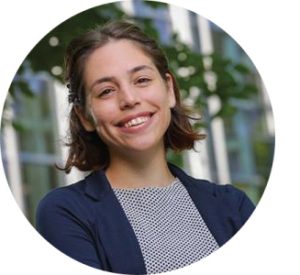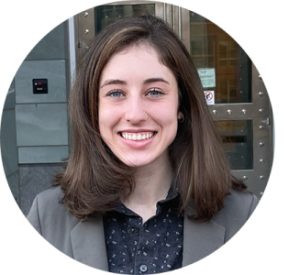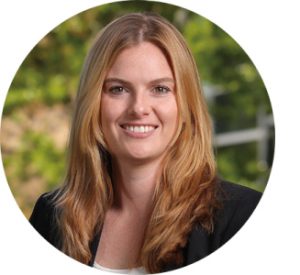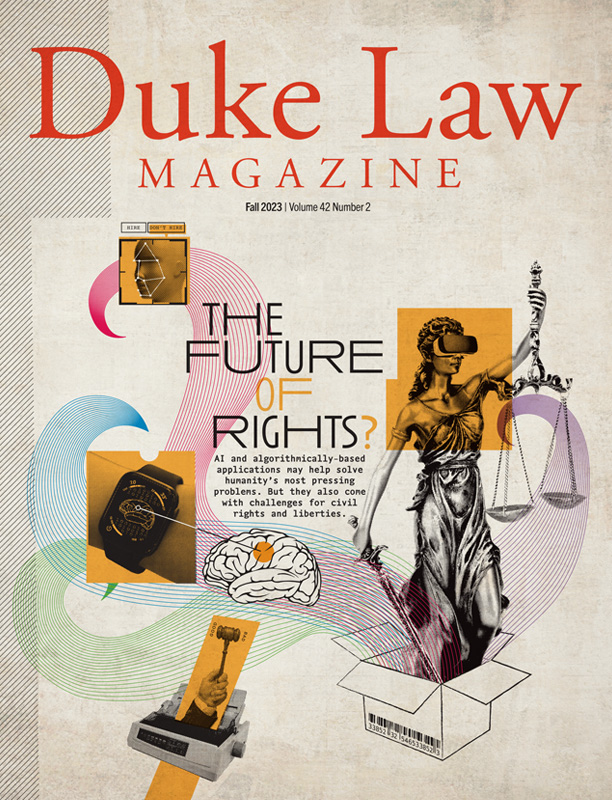
Recognizing significant legal clerkships, fellowships, and honors
Fall 2023

Ellen Goodrich ’23 and Lily Talerman ’23 are the inaugural recipients of the Farrin Fellowship, established by James Farrin ’90 and his wife Robin Farrin in 2021 to support graduating students in a year of domestic public interest legal work, preferably for low-income or indigent clients in the Carolinas and benefiting individuals or groups that have historically faced discrimination.

Talerman has joined the voting rights team at the Durham-based Southern Coalition for Social Justice, which partners with communities of color and indigent communities to defend their legal rights in areas including elections, police accountability, racial discrimination in the criminal legal system, and school discipline policies.
“It’s a big time for voting rights. I’m excited to be doing this work leading into a presidential election,” said Talerman, who worked on a political campaign between college and law school. “I’m also excited to get more invested in the South and the communities in North Carolina.”
Talerman said she was impressed by the organization’s focus on community lawyering and partnering with the people it serves.
“I don’t want to be a lawyer that just makes decisions for people without considering their input or experiences. I’ll be happy knowing that I’m letting community members lead and using the legal skills I’ve built at Duke Law to help them get there,” she said.
Goodrich has joined the Student Press Law Center, a Washington-based organization dedicated to the promotion, support, and defense of the First Amendment and press freedoms for high school and college journalists. She is working on its legal hotline as well as on legislation to expand press freedoms for student publications in North Carolina and direct outreach to students on First Amendment law.
“I have a journalism background and I’m also very interested in education, so I’m excited to work with an organization that is a perfect mix of both and help students understand their First Amendment rights,” said Goodrich.
“To have support from the Farrin Fellowship means a lot to me. It’s the reason that I’m able to do this work, and it’s nice to see a shared interest and willingness to invest in students’ futures.”
As student-attorneys in the First Amendment Clinic, both Goodrich and Talerman displayed passion, enthusiasm, and commitment to a vitally important area of the law, said Senior Lecturing Fellow Amanda Martin, the clinic’s supervising attorney, who recommended them for the fellowship.
“There’s not always a profit motive to the public interest sector, but there couldn’t be anything more fundamental to the function of democracy,” Martin said. “It really has to be a calling, and for Lily and Ellen, I believe it is. It’s another reason why the Farrin Fellowship is such a gift.”
Farrin is founder, president, and CEO of the Law Offices of James Scott Farrin, one of the largest personal injury and product liability firms in North Carolina.

Claudia Benz ’23 received one of two E. Barrett Prettyman Fellowships and in August began an intensive two-year training program in criminal trial advocacy and clinical teaching at Georgetown University Law Center.
Recipients of the highly competitive fellowship spend their first year representing indigent clients in local courts of the District of Columbia and their second year taking classes in clinical teaching and supervising students representing defendants in misdemeanor and juvenile cases through Georgetown Law’s clinics. Upon completion, fellows receive a master’s degree in advocacy.
Benz was co-director of the pro bono Juvenile Sentence Review Board Clemency Project and a student-attorney in both the Health Justice Clinic and the Criminal Defense Clinic. During her 3L fall semester she externed at the Durham Office of the Public Defender and represented a defendant at trial in traffic court, cross-examining a police officer and making the final argument.
“Indigent clients don’t just deserve free lawyers. They deserve really, really good lawyers,” Benz said.
Benz entered Duke Law School with a clear vision for her path. After graduating from the University of Chicago, she taught local fifth graders through Teach for America. There she began to more fully understand the issue of the school-to-prison pipeline and got to know families who had incarcerated relatives.
“That’s when I knew I wanted to work on the issue, and I thought public defense would be a way to work at an individual level,” Benz said. “I am so grateful for this opportunity and know that it will help me become a competent and effective public defender.”

Kelly Keglovits ’23 was awarded the Law School’s Keller Fellowship, which is supporting her work in North Carolina and South Carolina with Pregnancy Justice for one year.
Pregnancy Justice, previously known as National Advocates for Pregnant Women, defends the rights of pregnant people against state control and criminalization. The group represents people charged with crimes because of pregnancy or any pregnancy outcome — including birth, miscarriage, stillbirth, and abortion — and also engages in impact litigation, mobilization and public education, and research.
“When I entered law school, I knew this was what I wanted to do,” Keglovits said. “I came to Duke Law wanting to pursue a career in reproductive rights and the Keller Fellowship is allowing me to do that.”
Keglovits traces her interest in reproductive rights to seeing restrictions on abortion enacted in Oklahoma, where she grew up, and Texas, where she attended college. The Supreme Court’s decision last summer in Dobbs v. Jackson Women’s Health Organization, which overturned Roe v. Wade, only raised the stakes for her, she said.
Keglovits interned with the American Civil Liberties Union of Oklahoma during her 1L summer, followed by a 2L externship with Planned Parenthood South Atlantic. She spent her 2L summer at the Center for Reproductive Rights in New York, where she worked on challenges to state abortion restrictions passed after the Dobbs ruling. She also was a student-attorney in the Wrongful Convictions Clinic and Health Justice Clinic.
The Keller Fellowship was established by members of the class of 1987 in honor of their classmate John Keller, who has spent his career with Legal Aid of North Carolina.

Diana Kenealy JD/LLM ’23 was awarded Duke Law’s 2023 International Law and Human Rights Fellowship and has joined the Business and Human Rights Unit of the United Nations Office of the High Commissioner for Human Rights at its Geneva headquarters for the first of two six-month placements. She is focusing on improving corporate accountability for human rights on issues including forced labor and environmental damage.
“This fellowship allows me to jump right into a career in human rights law. I’ve had amazing opportunities to work on human rights accountability issues at Duke and I can’t wait to put those experiences into practice at the U.N.,” Kenealy said.
Kenealy spent her 2L summer working on anti-corruption and extradition issues with the U.S. Department of State and her 3L fall working on human trafficking accountability with the U.S. Department of Justice. She traveled to The Hague with the International Human Rights Clinic and was instrumental in creating and launching the Human Rights Pro Bono Project.
“Diana came to Duke Law committed to developing her expertise in human rights,” said clinic director Jayne Huckerby. “She combines theory and practice very effectively and takes extraordinary initiative in doing so.”
Established in 2017, the fellowship provides a bridge between law school and work in international human rights. Kenealy hopes to focus her career on accountability mechanisms for human rights abuse and redress for people whose rights are violated.
“The fellowship has enabled our students to do high-level, cutting-edge work in an area of law that is difficult to go into straight out of law school,” said Huckerby. “The work is extraordinarily impactful and important in the human rights space.”

